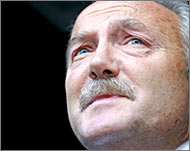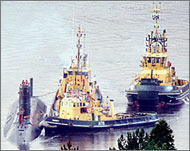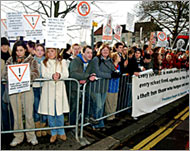UK anti-war movement struggles on
A year ago, two million people took to London’s streets to protest against the war in Iraq. This year’s turnout was paltry in comparison.

Some would argue that this is because the anti-war movement has failed, others that it is merely regrouping.
“Despite the fact that we put unprecedented numbers of people on the streets to stop the war, we can’t find a lever with which to make politicians listen,” says Mike Marqusee at Iraq Occupation Forces, a fledgling anti-war network.
The protests of 3 February 2003 saw stalwart pacifists, Muslims, numerous trade union members and youngsters marching for the first time walking side by side.
But the fact that Britain’s leaders ignored the action has frustrated some and demoralised others.
“The energy that was on the streets has transformed into cynicism,” says Paul Ingram, a Green party European candidate.
Developments
But the British anti-war movement is in a state of change. Demonstrations have taken on a regional flavour.
 |
|
George Galloway, co-founder of |
“If I were to flick through a diary of the past four weeks, I would see about 13 demonstrations across the country called by Stop the War,” says Anas al-Tikriti of the Muslim Association of Britain (MAB).
The group is part of the Stop the War coalition, the UK’s largest anti-war mobilisation machine.
Indeed, one reason for the regional focus might be that both European and local elections are taking place this June.
Respect, an alliance of socialist groups, and the Green party are both raising candidates for both elections on a strong anti-war and end-the-occupation ticket.
“If Labour loses seats up and down the country, it will send a message and pile immense pressure on the government to change its policies on Iraq,” says al-Tikriti.
He adds that taking three or four seats away from the Labour party in the local elections this June could be more effective than a two million-strong demonstration.
Military bases
In any case, to view the lack of a mass anti-occupation rally in Britain as a death knoll for protest might be a little short-sighted.
As well as regional demonstrations, there have been regular activities at the Faslane nuclear submarine base in Scotland – the site of Britain’s only permanent peace camp – as well as the US “spy base” at Menwith Hill, in North Yorkshire.
 |
|
A British nuclear submarine |
Demonstrations on other issues have also ended up supporting the anti-occupation protests. At London’s recent Critical Mass 10th anniversary demonstration, a collective bike ride with the aim of reclaiming the streets from car traffic.
This resulted in more than 1000 people and bikes stopping outside Downing Street, calling for an end to the occupation of Iraq.
Meanwhile, the onset of the war on Iraq did not dismantle the movement, as was the case during the first Gulf war.
Instead, thousands of local groups across the country have remained active. There are, for instance, still more than 450 regional groups affiliated to Stop the War.
“There are groups meeting regularly, organising actions, film screenings, speakers, leafleting – sustaining an anti-war idea and presence,” says Marqusee.
Leg work
Such local activity is the backbone of any protest movement.
“That’s the hard grind, the talking, leafleting and doing things on the streets – those are the seeds,” says Gabriel Carlyle at Voices UK, which campaigns against war and occupation in Iraq.
|
“The latent pressure exerted by the anti-war movement hovering offstage has meant that even the right-wing press is now forced to have a debate about the occupation” Mike Marqusee, |
That is even more the case now because there has been a shift in the argument – from anti-war to anti-occupation. If the polls are to be believed, the British public is less opposed to the occupation of Iraq than to the war on it.
That, however, may have changed in recent weeks, now that further evidence of abuse is coming out.
But such exposure is in itself a victory of the movement, says Marqusee.
“The latent pressure exerted by the anti-war movement hovering offstage has meant that even the right-wing press is now forced to have a debate about the occupation,” he says.
New moves
Behind the scenes, anti-war protesters are plotting the next move, which partly involves a pooling of skills and resources.
Both the Grassroots Opposition to War (Grow) network and Iraq Occupation Focus were recently formed with this in mind.
“It is about strengthening the grassroots to the anti-war movement,” says Milan Rai of Grow. “One of the things that make a difference to public opinion is what’s happening locally, on the ground, in people’s workplaces.
“If we get better at all those activities, it will affect public understanding of issues like the occupation of Iraq.”
Carlyle agrees. “We are encouraging people to learn new protest skills and deploy them,” he says. “For many people, it is simply a matter of gaining a bit more confidence and knowing there are groups that can help them facilitate action.”
Action is evolving. “It is striking that some British activists have gone to Iraq, come back and are giving reports,” says Marqusee.
Such reports are widely disseminated over the internet and speaking tours. One group in Oxford, meanwhile, recently read a report from inside Falluja over a sound system on the high street to the town’s Saturday shoppers.
Much of the focus has turned from politics to the business side of Iraqi occupation.
Wherever corporations meet in Britain to discuss business prospects in Iraq, they are likely to be greeted with opposition.
Groundbreaking
This already occurred at Iraq Procurement in London a few weeks ago, when demonstrators stalked a corporate conference on the distribution of Iraqi reconstruction contracts.
Meanwhile, according to Carlyle, anti-war activists have been buying shares in the engineering company AMEC, Britain’s largest beneficiary in the Iraqi reconstruction contract handout.
 |
|
Protestors await the arrival of |
Such share-ownership entitles attendance to the AMEC annual general meeting this June, at which the company is likely to be facing difficult questions about its presence in Iraq.
And other activities are emerging from the movement’s current incubation period. There is talk of building links with British troops who may have doubts about their deployment to Iraq. Such a move already has force in the US, with the vocal Military Families Against the War group.
There are plans afoot too, for 30 June: “We are encouraging people occupy various structures and spaces when the fraudulent handing over of power takes place in Iraq,” says Carlyle.
And, prior to that, George Bush Snr’s UK visit on 18 May is likely to provoke similar demonstrations to those surrounding his son’s visit last November.
What is clear, according to Marqusee, is that, although positive, these actions are not enough: “We need a lot more if we are going to reach a critical mass, one that makes the injustice of occupation an issue that people simply cannot ignore. But we are building.”